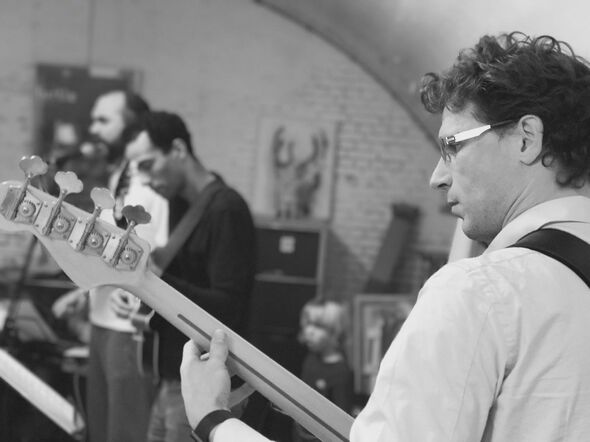
On the Concertgebouw stage with a robot
"I spent many hours composing on the train"
TU/e researcher Bart Hengeveld will start 2025 on stage at the Concertgebouw concert hall in Amsterdam. The assistant professor at Industrial Design is one of the creators of a multimedia music theater performance for children, about a world in which robots do all the work. One of the ‘actors’ is an industrial robot arm named Bob. “Its movements and voice are timed to the second, which give it an unmistakable human quality.”
For Bart Hengeveld, the love for music has always kept pace with his love for science. During his studies in Delft, he started a jazz band with friends and he combined his PhD in Eindhoven with a part-time program at the Rotterdam Conservatory, to further develop himself as a bass player and composer.
But how do you go from a band to a Concertgebouw-worthy performance? When the band members had children, they decided to start making jazz for children, Hengeveld says. “Partly out of self-interest,” he admits with a wink, “to ensure we wouldn’t have to listen to commercial alternatives for hours in the car heading to Southern France.” This resulted in three jazz projects for children, the last of which made it to the Concertgebouw stage.
Flea market
The metropolitan contacts came in handy when De Robot van de Rommelmarkt (The Flea Market Robot) saw the light of day. Together with bandmate Bram Ellens, an artist who gives robots a leading role in his installations, Hengeveld adapted the eponymous story from 1967 by author Tonke Dragt into a script for an hour-long musical theater performance.
Dragt, known for the Dutch children’s book classic De brief voor de koning (The Letter for the King), wrote a somewhat dystopian story about a future in which robots do all the work, from housework to the children's schoolwork. Hengeveld: "As a result, Edu – in the story Edu is a boy, in our performance a girl – doesn’t know the value of making an effort for something herself. She only discovers this when the house robot breaks down. She buys an old robot at the flea market as a replacement, which she then trains to do her homework."
That robot, Bob, is played by an industrial KUKA robot arm in the performance. “A robot without a face, but its movements and voice are timed to the second, which give it an unmistakable human quality,” says Hengeveld.
Crumbled cookie
How does he see the message that Dragt sent into the world more than half a century ago, based on his work in technology? “The story makes us think about the role of technology. It brings pleasure and convenience, but where does that stop and laziness begin?”
In addition, there are similarities with insights that Hengeveld and his colleagues want to pass on to their students. “For one thing, that it’s not self-evident that we should simply adapt to the constraints of technology. A classic example from my research group is the vending machine: first you have to enter a complicated code, then the machine throws your cookie down, after which you have to pry open a very heavy flap to get your crumbled cookie. If we don’t accept that from human sellers, why would we let a machine treat us that way?”
Composing on the train
On January 3 and 4, De Robot van de Rommelmarkt will be performed a total of four times for a crowded Concertgebouw – “Ticket sales are already at 70 percent”. For Hengeveld, it’s the culmination of a year and a half of preparation alongside his work at TU/e. “My most important role was writing the songs for the performance. I spent many hours composing on the train between Eindhoven and my hometown of Rotterdam. And then in the evenings and weekends I finetuned what I wrote, trying out how it sounds.”
How did he keep this up? “It also gives me a lot of energy! And precisely because I do it alongside my work, it stays fun.” After all that effort, will the curtain call on January 4 really be the final one? “That’s not for certain”, Hengeveld says, cautiously looking ahead. “We’re looking into bringing the performance to London's West End next year. I don’t know if we’ll manage, but I did already start translating the lyrics into English just in case.”


Discussion